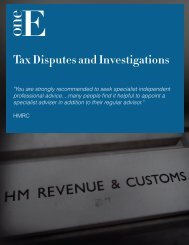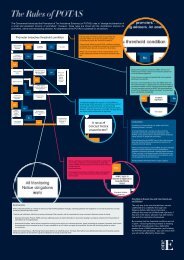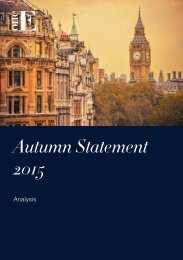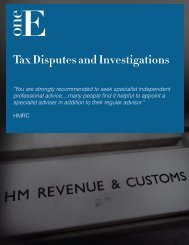Change to taxation of Landlords
You also want an ePaper? Increase the reach of your titles
YUMPU automatically turns print PDFs into web optimized ePapers that Google loves.
<strong>Change</strong>s<br />
<strong>to</strong> the Taxation<br />
<strong>of</strong> <strong>Landlords</strong><br />
What Your Clients Need <strong>to</strong> Know
Introduction<br />
The Chancellor unveiled a number <strong>of</strong> major<br />
changes <strong>to</strong> the <strong>taxation</strong> <strong>of</strong> landlords at the<br />
Summer Budget 2015 – brought in<strong>to</strong> effect<br />
under the Finance (No.2) Bill 2015 – with the<br />
potential <strong>to</strong> significantly increase the tax<br />
burden on property portfolios in coming<br />
years.<br />
The most significant change for landlords is<br />
the capping <strong>of</strong> tax relief on mortgage<br />
interest payments. This relief has been an<br />
integral part <strong>of</strong> the growth in the buy-<strong>to</strong>-let<br />
market, and a restriction will <strong>of</strong> course have<br />
pronounced implications. As an indication,<br />
an additional £665million in taxes is<br />
expected <strong>to</strong> be levied on landlords in 2020<br />
alone.<br />
This hand-out is written <strong>to</strong> provide landlords<br />
and their advisers with an awareness <strong>of</strong><br />
these changes and the implications, and the<br />
steps that can be taken <strong>to</strong> help ensure that<br />
property investments continue <strong>to</strong> perform in<br />
this new tax context.
Current position<br />
First the basics. Where property<br />
portfolios are owned personally rental<br />
pr<strong>of</strong>its are subject <strong>to</strong> income tax. In<br />
calculating rental pr<strong>of</strong>its, under the<br />
current rules landlords are allowed <strong>to</strong><br />
deduct the “finance costs” (primarily<br />
mortgage interest payments) associated<br />
with let property against their rental<br />
receipts.<br />
As a result <strong>of</strong> this favourable relief, highly<br />
leveraged portfolios have <strong>of</strong>ten proved<br />
commercially advantageous, with many<br />
landlords focusing on reinvesting rental<br />
pr<strong>of</strong>its in<strong>to</strong> acquiring new properties,<br />
rather than paying down existing debt.
Example<br />
Additional Rate – Alex’s Current Position<br />
Consider a landlord, Alex, paying tax at<br />
the additional rates (i.e. 45%) owning a<br />
highly leveraged portfolio, receiving<br />
£200,000 per year in rent and paying<br />
£150,000 a year on an interest-only<br />
mortgage:<br />
Here, even though Alex’s portfolio is<br />
highly leveraged, it continues <strong>to</strong> be<br />
pr<strong>of</strong>itable, in part due <strong>to</strong> tax relief<br />
ensuring that any amount spent on<br />
finance costs is fully deductible against<br />
his rental income subject <strong>to</strong> <strong>taxation</strong>.<br />
Rent:<br />
Mortgage:<br />
Tax Liability* at 45%:<br />
Rental Pr<strong>of</strong>its:<br />
£ 200,000<br />
£(150,000)<br />
£ (22,500)<br />
£ 27,500<br />
* The tax relief on mortgage interest<br />
payments reduces the amount <strong>of</strong> rent<br />
subject <strong>to</strong> tax <strong>to</strong> £50,000 (i.e. rent <strong>of</strong><br />
£200,000 minus £150,000 mortgage<br />
interest payments), which in this example<br />
is subject <strong>to</strong> tax at 45%.
Understanding the<br />
changes<br />
From April 6th 2017 onwards these rules<br />
will begin <strong>to</strong> change. The relief on<br />
finance costs will begin <strong>to</strong> be restricted<br />
until tax relief will be available at the<br />
basic rate <strong>of</strong> income tax (i.e. 20%) only:<br />
- Tax Year 2017-18:<br />
75% full finance costs relievable, 25%<br />
restricted <strong>to</strong> basic rate tax deduction<br />
- Tax Year 2018-19:<br />
50% full finance costs relievable, 50%<br />
restricted <strong>to</strong> basic rate tax deduction.<br />
Significant additional costs will arise <strong>to</strong><br />
landlords as a result <strong>of</strong> these changes,<br />
with the worst affected being those that<br />
own property portfolios that are highly<br />
leveraged.<br />
It is important <strong>to</strong> note that, although the<br />
relief will be restricted <strong>to</strong> basic rate, even<br />
landlords that currently pay tax at basic<br />
rate may find themselves significantly<br />
worse <strong>of</strong>f. See the example further in this<br />
hand out for illustration.<br />
- Tax Year 2019-20:<br />
25% full finance costs relievable, 75%<br />
restricted <strong>to</strong> basic rate tax deduction.<br />
- Tax Year 2020-21:<br />
all basic rate tax deduction
Example<br />
Additional Rate – Alex’s Position from 2020<br />
Alex, the landlord, still pays tax at the<br />
additional rates on his highly leveraged<br />
portfolio.<br />
The new rules on the rules on<br />
deductibility <strong>of</strong> finance costs are now<br />
fully in place (i.e. from 2020-21 onwards),<br />
but no changes were made by Alex <strong>to</strong><br />
adapt:<br />
Rent:<br />
Mortgage:<br />
£ 200,000<br />
£(150,000)<br />
As a result <strong>of</strong> these new rules, Alex’s<br />
property portfolio, which was previously<br />
pr<strong>of</strong>itable, now makes a loss <strong>of</strong> £10,000<br />
p/a.<br />
Insufficient income is retained after tax <strong>to</strong><br />
make the mortgage payments, putting<br />
the landlord in a precarious position. This<br />
simple scenario highlights how the<br />
changing tax context may affect the<br />
viability <strong>of</strong> property investments unless<br />
steps are taking <strong>to</strong> adjust <strong>to</strong> these<br />
changes.<br />
Tax Liability at 45%*:<br />
Rental Pr<strong>of</strong>its:<br />
£ (60,000)<br />
£ (10,000)<br />
* The tax calculation is now a little more<br />
complicated. We first look treat the entire<br />
rent as assessable on Alex (i.e. £200,000<br />
@ 45% = £90,000) and deduct tax relief<br />
on the mortgage payments as a “tax<br />
reducer” at basic rate (£150,000 @ 20%<br />
= £30,000), leaving a tax liability <strong>of</strong><br />
£60,000.
Example<br />
Additional Rate – Bob’s Position 2016 vs.<br />
2020<br />
Let’s look at a different scenario, which<br />
helps highlight how even basic rate<br />
taxpayers can be significantly affected<br />
by these new rules.<br />
Bob, a landlord and retiree, receives<br />
rental income from his property portfolio,<br />
however, due <strong>to</strong> the significant mortgage<br />
interest payments, and his lack <strong>of</strong> other<br />
sources <strong>of</strong> income, the net rental pr<strong>of</strong>its<br />
are low, and assessable <strong>to</strong> tax at basic<br />
rate.<br />
In 2016 the position is as follows:<br />
Rent:<br />
Mortgage:<br />
Tax Liability at 20%<br />
Rental Pr<strong>of</strong>its:<br />
£ 150,000<br />
£(125,000)<br />
£ ( 5,000)<br />
£ 20,000<br />
As we can see, at the moment Bob’s<br />
income from the rental portfolio is firmly<br />
within his personal allowance / basic rate<br />
band, allowing him <strong>to</strong> generate an<br />
acceptable level income during his<br />
retirement.<br />
However, by 2020 Bob’s entire rental<br />
income <strong>of</strong> £150,000 per annum will be<br />
assessable <strong>to</strong> income tax, pushing him<br />
well in<strong>to</strong> the higher rates <strong>of</strong> tax.<br />
Although relief on mortgage interest is<br />
given as a “tax reducer” at 20%, this will<br />
not fully <strong>of</strong>fset the significant amount <strong>of</strong><br />
rental income that will be taxed at the<br />
higher rates as a result <strong>of</strong> these changes.<br />
Without any change <strong>to</strong> his investment<br />
structure Bob will may find himself living<br />
a much more frugal existence during his<br />
retirement as a result.
Adapting <strong>to</strong><br />
the <strong>Change</strong>s<br />
We have illustrated the implications <strong>of</strong><br />
these changes <strong>to</strong> the <strong>taxation</strong> <strong>of</strong><br />
landlords.<br />
Let’s now take a look at some <strong>of</strong> the<br />
options that are available for landlords <strong>to</strong><br />
adapt:<br />
1. Deleveraging the Portfolio:<br />
First, the most obvious “solution”. Many<br />
commenta<strong>to</strong>rs have <strong>to</strong>uted the<br />
deleveraging <strong>of</strong> property portfolios (i.e.<br />
selling properties and using the<br />
proceeds <strong>to</strong> repay mortgages) <strong>to</strong> be the<br />
obvious solution for the worst hit<br />
landlords. However, the difficulties<br />
associated with this approach are <strong>of</strong>ten<br />
overlooked.<br />
Highly leveraged portfolios typically arise<br />
from regular refinancing, the cash from<br />
which is spent on growing the portfolio<br />
further.<br />
Where this has occurred over a number<br />
<strong>of</strong> years <strong>of</strong> ownership and capital growth,<br />
there may be insufficient equity – after<br />
lending has been repaid – <strong>to</strong> meet the<br />
costs associated with the disposal.<br />
We now consider an example <strong>of</strong> the<br />
implications <strong>of</strong> a sale <strong>of</strong> a highly<br />
leveraged property.
Example<br />
Disposals – Dan’s Position on Sale <strong>of</strong><br />
Properties<br />
Dan, is a higher rate taxpayer who is selling part <strong>of</strong> his portfolio <strong>to</strong> help<br />
deleverage. The property in question has been owned since 1990, during which<br />
time the value has increased from £100,000 <strong>to</strong> £350,000. Dan has regularly<br />
refinanced and used these funds <strong>to</strong> expand his portfolio, with the property<br />
currently subject <strong>to</strong> a mortgage <strong>of</strong> £300,000. The implications <strong>of</strong> a sale are<br />
detailed below:<br />
Tax Position:<br />
Overall Position:<br />
Proceeds on sale:<br />
£ 350,000<br />
Proceeds on sale:<br />
£ 350,000<br />
Base cost:<br />
£(100,000)<br />
Mortgage Repayment:<br />
£(300,000)<br />
Taxable Gain<br />
£ 250,000<br />
Taxable Gain<br />
£ 250,000<br />
CGT @ 28%:<br />
£ (70,000)<br />
CGT @ 28%:<br />
£ (70,000)<br />
This represents a net loss <strong>of</strong> £20,000 on sale <strong>of</strong> the properties.<br />
We can see that, for Dan and other landlords in this position, a sale <strong>of</strong> a property<br />
isn’t always going <strong>to</strong> improve the position (and can even make matters worse).<br />
Unfortunately those worst hit by these changes – landlords with highly leveraged<br />
property portfolios – will be those with the least flexibility <strong>to</strong> reduce lending.<br />
Clients are advised <strong>to</strong> look closely at their portfolio when identifying suitable<br />
properties for disposal, in light <strong>of</strong> the tax as well as commercial implications.<br />
As a final thought in this area, it is worth considering that improving the equity <strong>to</strong><br />
lending ratio on property portfolios may ultimately not be the decision <strong>of</strong> the<br />
landlords. Given the implications <strong>of</strong> these changes on pr<strong>of</strong>itability <strong>of</strong> rental<br />
investments, lenders are expected <strong>to</strong> become more stringent in their lending<br />
criteria.
Adapting <strong>to</strong><br />
the <strong>Change</strong>s<br />
Continued...<br />
We have illustrated the implications <strong>of</strong><br />
these changes <strong>to</strong> the <strong>taxation</strong> <strong>of</strong><br />
landlords.<br />
Let’s now take a look at some <strong>of</strong> the<br />
options that are available for landlords <strong>to</strong><br />
adapt:<br />
1. Deleveraging the Portfolio:<br />
First, the most obvious “solution”. Many<br />
commenta<strong>to</strong>rs have <strong>to</strong>uted the<br />
deleveraging <strong>of</strong> property portfolios (i.e.<br />
selling properties and using the<br />
proceeds <strong>to</strong> repay mortgages) <strong>to</strong> be the<br />
obvious solution for the worst hit<br />
landlords. However, the difficulties<br />
associated with this approach are <strong>of</strong>ten<br />
overlooked.<br />
Highly leveraged portfolios typically arise<br />
from regular refinancing, the cash from<br />
which is spent on growing the portfolio<br />
further.<br />
Where this has occurred over a number<br />
<strong>of</strong> years <strong>of</strong> ownership and capital growth,<br />
there may be insufficient equity – after<br />
lending has been repaid – <strong>to</strong> meet the<br />
costs associated with the disposal.<br />
We now consider an example <strong>of</strong> the<br />
implications <strong>of</strong> a sale <strong>of</strong> a highly<br />
leveraged property.
Example<br />
Incorporation – Iain’s Position from 2020<br />
with Incorporation<br />
In the earlier example we saw that these<br />
changes resulted in the landlord, Alex,<br />
being unable <strong>to</strong> meet their mortgage<br />
payments by £10,000 per year. Let’s take<br />
a look at Iain, a landlord in the same<br />
scenario, who instead chose <strong>to</strong><br />
incorporate his portfolio:<br />
Rent:<br />
£ 200,000<br />
* As there is no restriction for tax relief for<br />
companies, the mortgage interest<br />
payment reduces the amount <strong>of</strong> rent<br />
subject <strong>to</strong> tax <strong>to</strong> £50,000 (i.e. rent <strong>of</strong><br />
£200,000 minus £150,000 mortgage<br />
interest payments), which in this example<br />
is subject <strong>to</strong> tax at 18% (the reduced rate<br />
effective from 2020/21).<br />
Mortgage:<br />
Tax Liability at 18%*:<br />
Rental Pr<strong>of</strong>its:<br />
£(150,000)<br />
£ (9,000)<br />
£ 40,100<br />
We can see that the property portfolio <strong>of</strong><br />
Iain is significantly more pr<strong>of</strong>itable than<br />
Alex’s in 2020-21, with the only difference<br />
being that incorporation has taken place.<br />
It is important <strong>to</strong> note that, due <strong>to</strong> the<br />
limited liability nature <strong>of</strong> corporates,<br />
banks will <strong>of</strong>ten look <strong>to</strong> impose more<br />
costly interest terms, which can increase<br />
the costs <strong>of</strong> lending. Furthermore, if the<br />
rental pr<strong>of</strong>its were extracted via<br />
dividends further tax would be due (and<br />
readers may be aware that the <strong>taxation</strong><br />
<strong>of</strong> dividends also saw change in the<br />
Budget). However, depending on the<br />
scenario (and certainly where the pr<strong>of</strong>its<br />
are reinvested rather than extracted), the<br />
additional tax may be small or nil.
Considering<br />
Incorporation?<br />
Two important questions must be<br />
considered when discussing the<br />
incorporation <strong>of</strong> a property portfolio:<br />
1. Will incorporation be more efficient<br />
than personal ownership?<br />
2. What costs will be incurred in<br />
incorporation?<br />
Looking at the first question, in<br />
considering whether incorporation is a<br />
better structure than personal ownership<br />
there are a number <strong>of</strong> points that must be<br />
considered:<br />
- Does the client require the income for<br />
subsistence, or would prefer it was<br />
retained / reinvested in the property<br />
business?<br />
- Are they a basic, higher or additional<br />
rate taxpayer?<br />
- How highly leveraged is the portfolio,<br />
and therefore, how affected might your<br />
client’s property portfolio be by these<br />
changes?<br />
- Are they primarily focused on reducing<br />
costs, or are the other advantages <strong>of</strong> a<br />
limited company (such as limitation <strong>of</strong><br />
liability) also considered attractive?<br />
If there’s one thing we’ve learned on<br />
advising landlords over the years, it’s that<br />
there really is no one-size-fits-all<br />
approach <strong>to</strong> advice in this area. Only by<br />
ensuring the landlord discusses their<br />
objectives in detail with an experienced<br />
practitioner is it possible <strong>to</strong> determine the<br />
right investment structure.<br />
Next, when determining the costs on<br />
incorporation, we must first mention that<br />
we can’t go in<strong>to</strong> detail. However, in<br />
general terms, alongside the set up and<br />
compliance costs <strong>of</strong> a company (which<br />
are not <strong>to</strong>o expensive), a transfer <strong>of</strong><br />
property in<strong>to</strong> a limited company would<br />
typically result in capital gains tax and<br />
stamp duty land tax consequences (as if<br />
it were a market value sale <strong>to</strong> a third<br />
party).<br />
This can be costly. However, statu<strong>to</strong>ry<br />
reliefs are available <strong>to</strong> reduce – or even<br />
eliminate – these tax charges where<br />
certain conditions are met and, where<br />
appropriately structured, additional tax<br />
advantages can arise, such as an uplift<br />
in base cost <strong>of</strong> the properties. It’s<br />
important <strong>to</strong> note that this is all about<br />
making use <strong>of</strong> tax reliefs in the way they<br />
are intended in light <strong>of</strong> recent case law<br />
and HMRC practice.
Adapting <strong>to</strong><br />
the <strong>Change</strong>s<br />
Continued...<br />
We’d always recommend pr<strong>of</strong>essional<br />
advice is taken from a tax specialist<br />
when considering these matters <strong>to</strong><br />
ensure the appropriate structure is<br />
identified and implemented without<br />
incurring unnecessary tax charges.<br />
OneE would be happy <strong>to</strong> assist in this<br />
area, and have expertise which can<br />
assist not only with mitigating the<br />
potentially significant effect <strong>of</strong> these<br />
punitive new tax rules, but can also<br />
proactively assist clients with their<br />
succession / estate planning objectives,<br />
and/or planning for future disposals.
Other changes <strong>to</strong><br />
Property <strong>taxation</strong><br />
In other news, wear and tear allowance<br />
(worth 10% <strong>of</strong> gross rental receipts for<br />
landlords <strong>of</strong> furnished accommodation)<br />
is <strong>to</strong> be abolished from April 2016<br />
onwards. It will be replaced with a<br />
deduction for costs as they actually incur<br />
on replacement – notably no deduction<br />
will be available on initial purchase. This<br />
was a significant tax relief for landlords,<br />
given that it was <strong>of</strong>fset against gross<br />
rental receipts. It will no doubt be sorely<br />
missed, and may fac<strong>to</strong>r in<strong>to</strong> the<br />
decisions <strong>of</strong> landlords over whether <strong>to</strong><br />
<strong>of</strong>fer furnished accommodation in the<br />
future.<br />
There is some good news for property<br />
owners – after many years <strong>of</strong> being fixed<br />
at £4,250, rent-a-room relief is <strong>to</strong> be<br />
increased <strong>to</strong> £7,500 per annum.<br />
Rent-a-room relief applies <strong>to</strong> income from<br />
providing furnished residential<br />
accommodation in the taxpayer’s only or<br />
main home, i.e. lodgers.
Final thoughts<br />
In summary, the recent changes <strong>to</strong> the<br />
<strong>taxation</strong> <strong>of</strong> property portfolios are broad in<br />
scope and will significantly alter the<br />
economics <strong>of</strong> property investment.<br />
The new rules will be brought in gradually,<br />
and although plenty <strong>of</strong> time is available <strong>to</strong><br />
plan ahead, we’d recommend landlords<br />
consider the implications at the earliest<br />
opportunity. Only by doing so can they<br />
remain ahead <strong>of</strong> the curve, and continue <strong>to</strong><br />
maintain healthy returns on their<br />
investments.<br />
As a specialist tax advisory firm in the area<br />
<strong>of</strong> property <strong>taxation</strong>, OneE are always on<br />
hand <strong>to</strong> discuss individual scenarios on a<br />
no-obligation basis, and help identify the<br />
most suitable options. If your client may be<br />
affected by these new rules, and would like<br />
expert advice, please do not hesitate <strong>to</strong> get<br />
in <strong>to</strong>uch.












